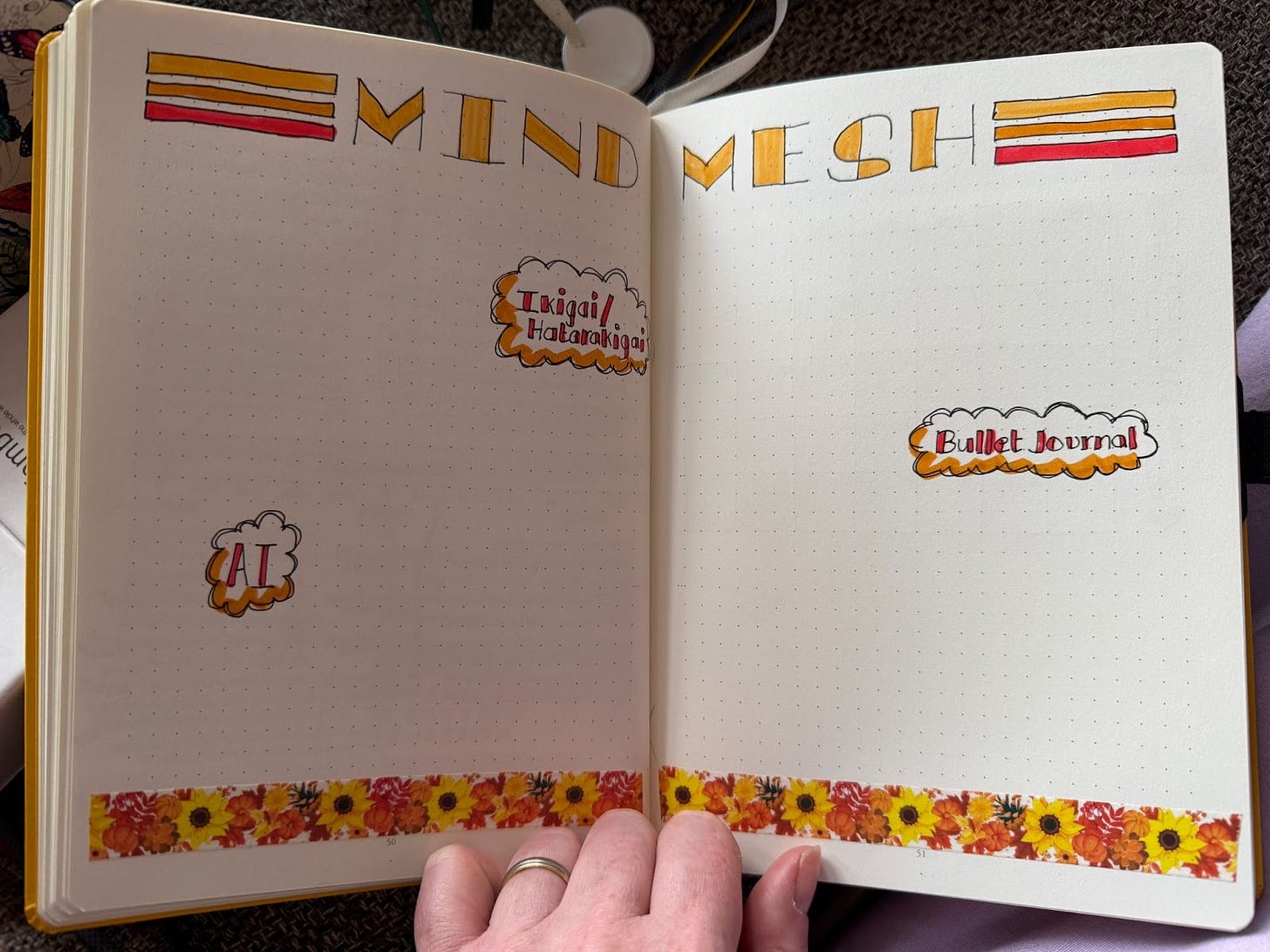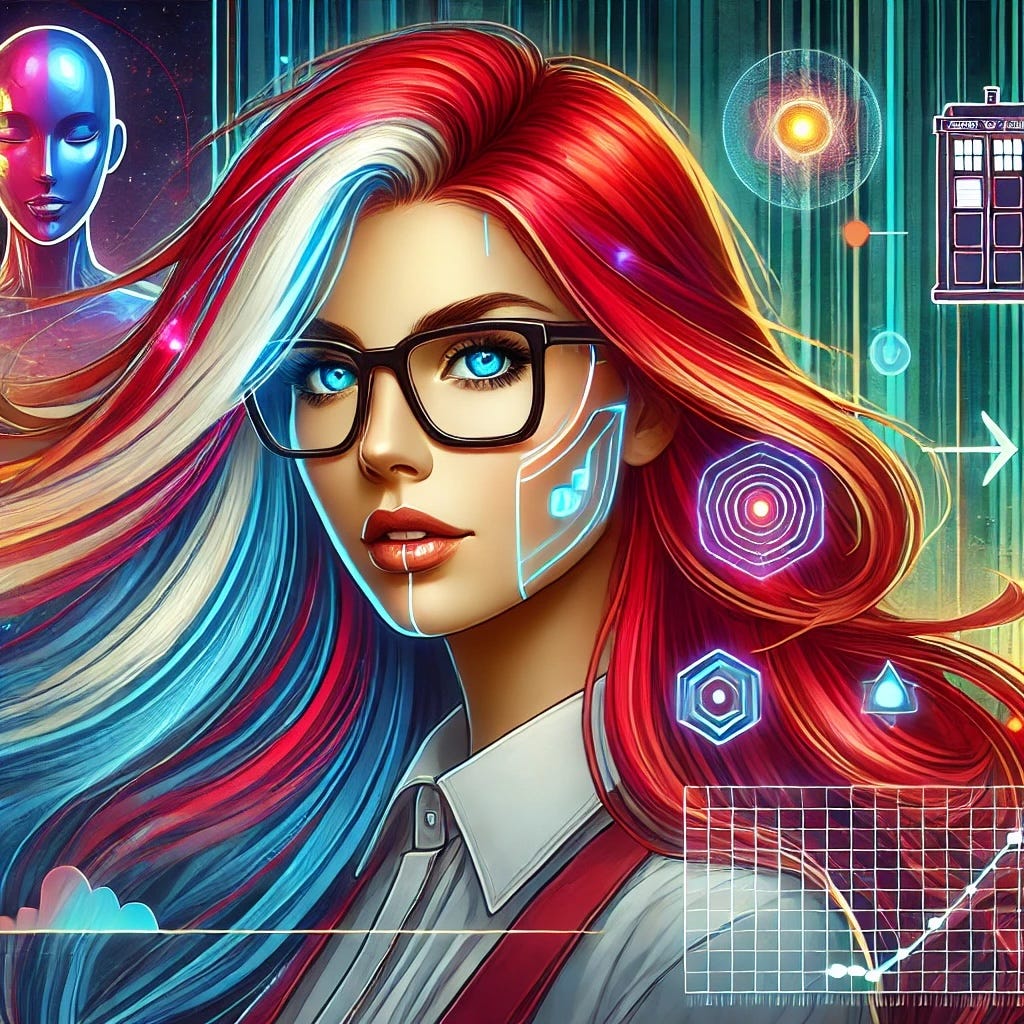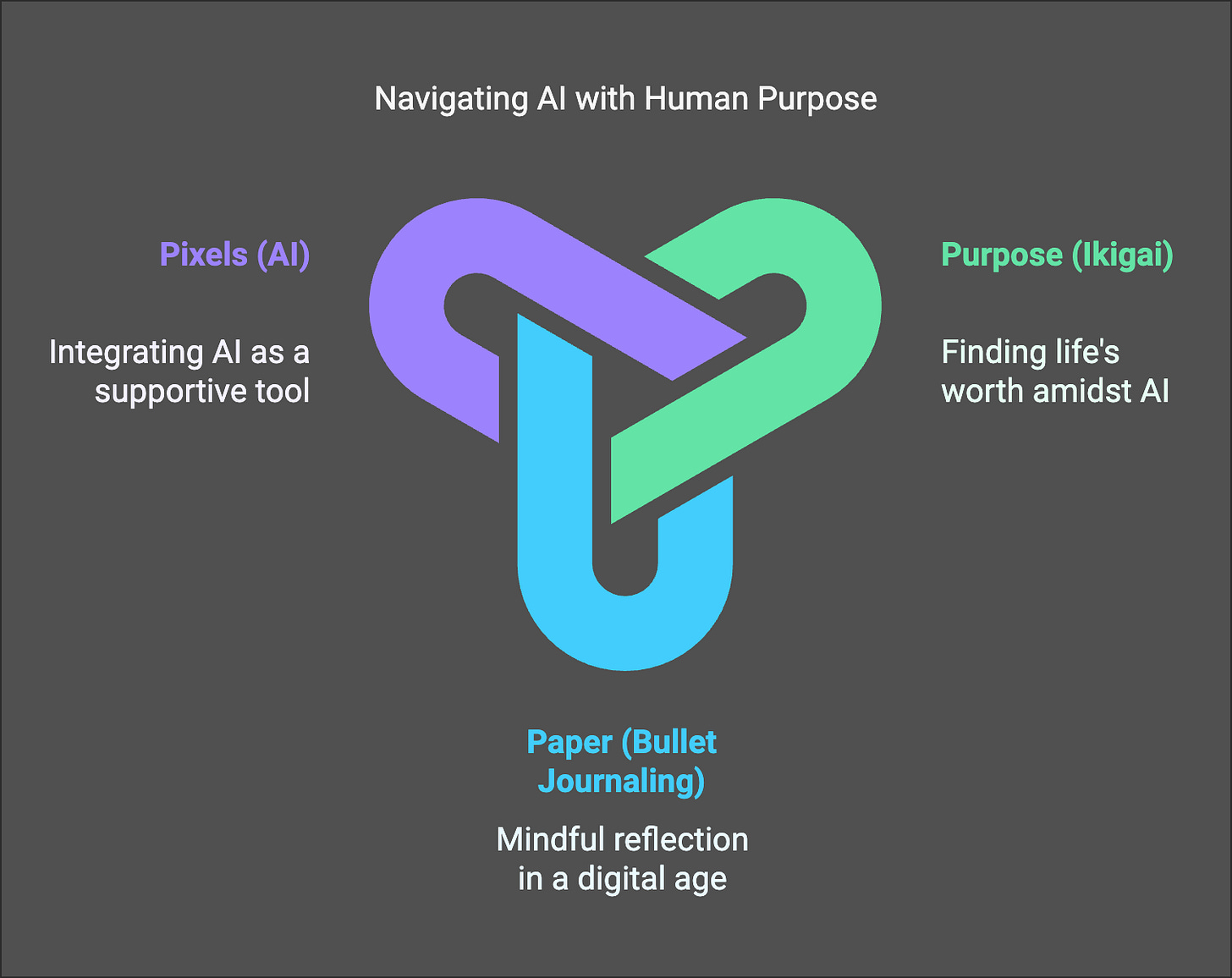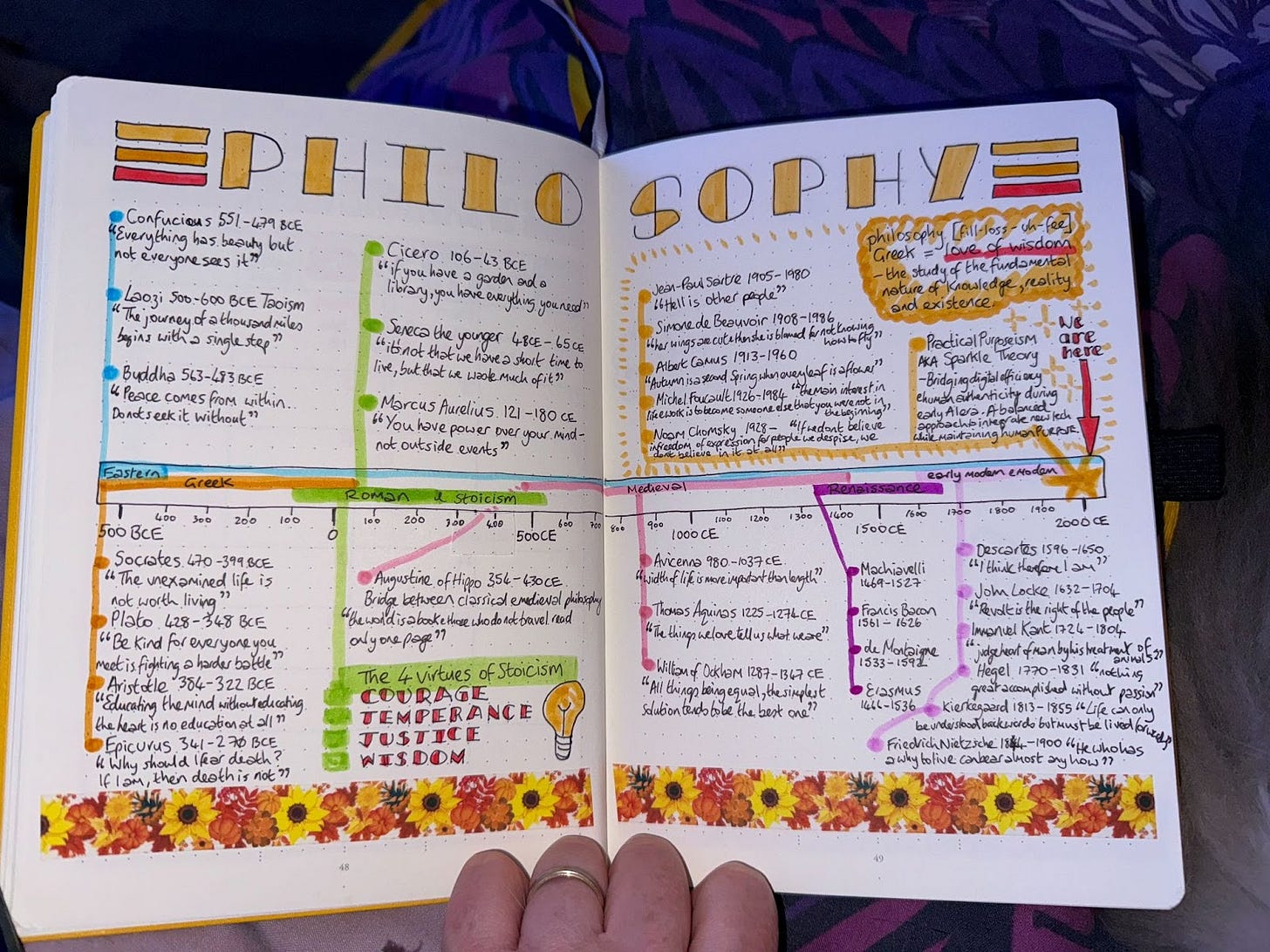🌸 ikigai 生き甲斐 is a reason for being, your purpose in life - from the Japanese iki 生き meaning life and gai 甲斐 meaning worth 🌸
I fell in love with sci-fi HARD as a tiny child, being a precocious reader I discovered Asimov’s robots early on. Star Trek was always on repeat and I grew up waiting each week to see what happened in the Doctor Who cliffhanger (age giveaway that I have hazy Tom Baker memories, though Peter Davison was really *my* first proper Doctor). It's still my favourite show of all time.
It’s no surprise then that this geeky girl adores the excitement of rapid artificial intelligence (AI) advancement. I’m living in the future peeps, and I am here for it! I think it’s so cool that Claude can help me understand myself better and that ChatGPT can make the images in my mind real (well mostly, after a *lot* of messing around with prompts, ahem!).
As a mother and empathetic human who wants the world to be a better place, I’m also more than a little apprehensive about how we will collectively manage the impact of AI on our world in the short to medium term. I’m thinking a LOT about ethics and what makes us uniquely human and how that becomes more precious than ever.
We're living through a pivotal moment in history where developing both AI literacy and human agency will be essential for thriving.
My obsession with the intersection of purpose, paper and pixels (ikigai, bullet journaling and AI) stems from a deep desire to help people navigate major societal changes without losing their sense of self and purpose.
Ken Mogi who I greatly admire, recently talked about the ikigai risk of AI, saying that we must ensure our embrace of artificial intelligence doesn't diminish human purpose and fulfillment. I can see this being a theme I will keep returning to in my writing to think and learn throughout this year.

In looking at life through these three lenses, my evolving niche intersections, I'm confident I am developing robust practices that help me create and maintain meaning and joy in this rapidly changing world;
PURPOSE (ikigai/hatarakigai) - This is the Japanese concept of finding your reason for being, while hatarakigai focuses specifically on discovering work worth doing. As machines take over routine tasks, understanding these principles becomes so important. They help us identify where our passions, skills, and the world's needs intersect, creating work that feels more like play.
PAPER (bullet journaling) - Analogue reflection is so powerful, and this methodology is a mindfulness practice disguised as a productivity system. Using just pen and paper, it creates a sacred space for processing thoughts, tracking growth, and maintaining our humanity. In our digital world, this analogue practice becomes revolutionary.
PIXELS (AI) - Mindful technology integration of AI tools like Claude and ChatGPT into our lives, so we can move beyond fear that they are threats to replace us but opportunities to get ahead of the curve in enhancing our capabilities. By thoughtfully integrating these tools while maintaining our analogue practices, we can maximise technology's benefits while preserving what makes us uniquely human.
As Dan Koe beautifully articulates;
"The ultimate goal is to have a life so beautifully designed that work, rest, and play cease to exist. The entirety of your life is channeled into one singular yet evolving vision."
This resonates deeply with me because it captures the essence of why I am so obsessed with hatarakigai and what happens when those elements align, the boundaries between work and leisure blur into one purposeful flow.
In thinking about AI adoption more broadly, I also think the magic happens at an intersection, where human discernment meets technological capability. As Professor Ethan Mollick recently noted; while AI can generate multiple options it's our uniquely human qualities of taste, discernment, and curation that make the final versions and choices meaningful. These skills, honed through experience and emotion, become more valuable, not less, in an AI-enhanced world.
This is particularly exciting for those of us in midlife. We bring decades of accumulated wisdom and pattern recognition to the table, exactly the kind of deep, contextual understanding that AI can complement but not replace. GenX have already navigated massive technological changes; we're perfectly positioned to thoughtfully integrate AI while maintaining our essential humanity.
With this experience comes responsibility. As digital pioneers who grew up in a pre-internet world, I think we need to look out for younger generations. To help them discover the joy of learning for learning's sake and understand the importance of developing core cognitive skills through some analogue practice. Building up foundational capabilities separately to AI will paradoxically allow us to truly harness AI's potential, both for work and creativity. We can bridge the gap between digital natives and deep human wisdom, ensuring that technological advancement enhances rather than diminishes human potential (WALL-E anyone?).
Also it’s worth reminding people that being able to still do things ourselves, if your favourite AI tool is inaccessible, will remain a good idea for the foreseeable future!
This isn't about resisting change, it's about embracing it mindfully. The future belongs not to those who can outcompete AI, but to those who can maintain their human spark while working alongside it when it is appropriate to do so. Our greatest strength lies not in processing power but in our capacity for joy, creativity, emotion and meaningful connection.
Why does this matter so much to me? I've seen too many people lose themselves in the daily grind (or drink to numb themselves from it), not seeing the magic that makes them uniquely human.
When we combine ancient wisdom like ikigai with practical tools like bullet journaling and thoughtful technology use, we can create a practice that helps us stay grounded while still moving forward. It's about designing a life where every day contributes to something meaningful, where work feels like play because it aligns with our deepest purpose. As this framework continues to evolve (watch this space for some product releases in 2025!), I'm excited to see if it might spark joy and transformation for others too.
The dream isn't just to survive this technological transition but to shape it intentionally. By developing strong agency now, understanding AI's capabilities while nurturing our uniquely human skills, we can ensure technology serves human flourishing rather than diminishing it.
What practices help you stay connected to your humanity in this rapidly changing world? How might you blur the lines between work and play in your own life?
Sarah, seeking ikigai xxx
PS - A technological advance is an opportunity to refocus on what makes us uniquely human. Let's use these tools wisely while nurturing our essential spark. Ready to explore your own intersections? Here are some journal prompts to get started:
Journal prompts and spread ideas;
"What tasks in my day could AI help with, and what aspects should only have a human touch (if any)?"
"Where do I feel most authentically me, what activities make me lose track of time?"
"How might I use technology to enhance rather than replace my creativity?"
Create sacred space: Dedicate 10 minutes each day to analogue reflection, just you, a pen, and paper
Purpose audit: List your daily activities and mark each as either 'energising' or 'draining' to make sure you aren’t getting AI to do all the things you enjoy the most
Mindful Integration: Before adopting any new tech tool, ask "Does this serve my purpose or distract from it?"
This is about thoughtful experimentation. Start where you are, use what you have, and take one small step forward each day.
PPS - Want to see a playful example of using AI creatively for personal development? I recently asked Claude (who has access to all of my posts) to articulate what someone finding my essays in a couple of hundred years time would call my school of philosophy.
Claude dubbed it "Practical Purposeism" or "Sparkle Theory" and described it as a philosophy combining pragmatic self-development with joyful authenticity.
“The key thesis: purpose and meaning aren't distant ideals achieved through suffering or complexity, but emerge through intentional daily practices, genuine self-expression, and the mindful integration of modern tools with timeless wisdom. True growth comes from embracing both structure (bullet journaling, frameworks) and sparkle (creativity, joy, authentic self-expression), while maintaining a commitment to kindness and community.”
My favourite bit though was; “Your work would be seen as particularly significant for emerging during the early AI era, offering a balanced approach to integrating new technologies while maintaining human authenticity and purpose. Your emphasis on kindness and community would be viewed as an important counterpoint to the often isolated and algorithm-driven nature of early 21st century life.”
I love it, and not something I would have come up with. Letting an AI partner say nice things about you is easier than doing it yourself hehe. So AI-assisted reflection helped clarify my own thinking, a partner in personal growth. It doesn’t replace human insight, but offers fresh perspectives that we can then curate and build upon with our uniquely human wisdom. See what I did there? *grin*







Sparkle theory. I love this so much. We should have a nerd out in the new year on Claude!